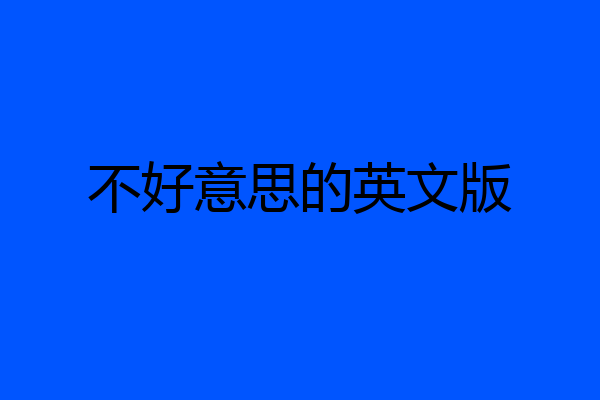
茉莉芬芳2008
不好意思是一个汉语短语,意思是指用于程度较轻的道歉,英文你可以用Excuse me或者pardon(pardon多译作“原谅”),也可用sorry。 就看你在什么场合用了。 Excuse me通常在说或做可能令人不悦的事情之前使用;而Sorry在说或做这种事情之后使用,表示歉意。 Excuse me通常在要打扰别人或要打断别人谈话或要吸引别人注意时使用。


脸红红1121
日常生活中,我们有的时候会遇见一些令人不好意思、觉得尴尬的事情,那么你知道不好意思的英文是什么吗?下面是我为你整理的不好意的的英文,希望你喜欢!
1.embarrassed
2.be ill at ease
3. be ashamed of
adj.局促不安的; 为难的; 尴尬的; 窘迫的
v.(使)窘迫,(使)局促不安( embarrass的过去式和过去分词);
1. They wolf-whistled at me, and I was so embarrassed I tripped up.
他们吹口哨挑逗我,我窘迫之下绊了一跤。
2. This practice embarrassed Luther, but he let it pass without comment.
这种做法让卢瑟难堪,但是他未置一词。
3. Polly, bewildered and embarrassed, dropped her head and scuffed her feet.
波莉既困惑又尴尬,低下头拖着脚走开了。
4. I think she was hugely embarrassed by the whole scene.
我认为整个场面让她极其尴尬。
5. She was embarrassed at showing her fear so nakedly.
她对于如此直接地表露了自己的恐惧感到尴尬不已。
6. "You can tell that he is extremely embarrassed," Mr Brigden added.
“你能看出他尴尬极了,”布里格登先生补充道。
7. He looked a bit embarrassed.
他看起来有点尴尬。
8. Candida admits to having been "mortally embarrassed".
坎迪达承认当时“尴尬得要命”。
9. Do you think she was embarrassed about it?
你觉得她曾为此而难为情吗?
10. William was angered and embarrassed by his oversight.
威廉因为自己的疏忽而羞愤交加。
1. With two children bedridden the mother was ill at ease.
两个孩子病得躺在床上,母亲非常焦急.
2. The boy was ill at ease in the presence of the headmaster.
那男孩在校长面前感到局促不安.
3. He always feels rather ill at ease before strangers.
他在陌生人面前总有些不自在.
4. He appeared embarrassed and ill at ease with the sustained applause that greeted him.
向他致意的掌声一直不歇,他显得有些难为情,不知如何是好。
5. Unable to withstand her " once - over, " Jou - chia felt awkward and ill at ease.
柔嘉经不起她这样看一遍, 局促不安.
6. Gral Lagher was ill at ease and then abruptly frantic.
加拉赫愈听愈不安,后来突然就象疯了一样.
7. He was ill at ease until Dawson's Landing was behind him.
他提心吊胆,直到道生码头被甩在后面,才放下心来.
8. She looked as ill at ease as the Major.
她看来同少校一样地坐立不安.
9. The dazzle of the spotlights made him ill at ease.
聚光灯的耀眼强光使他局促不安.
10. He felt ill at ease in the strange surroundings.
在生疏的环境中,他感到局促不安.

小苏果果
不好意思是一个汉语短语,意思是指用于程度较轻的道歉,英文你可以用Excuseme或者pardon(pardon多译作“原谅”),也可用sorry。就看你在什么场合用了。Excuseme通常在说或做可能令人不悦的事情之前使用;而Sorry在说或做这种事情之后使用,表示歉意。 Excuseme通常在要打扰别人或要打断别人谈话或要吸引别人注意时使用。

丫丫King
不好意思
英文:excuse me
读法:英 [iksˈkju:z mi:] 美 [ɪkˈskjuz mi]
例句:Excuse me, but I'll have to go now.
不好意思,我得走了。
词汇解析:
excuse
英 [ɪkˈskju:s] 美 [ɪkˈskjuz]
1、vt. 原谅;辩解
2、n. 理由;辩解;借口
词汇搭配:
1、demand an excuse 要求道歉
2、find an excuse 找到借口
3、give an excuse 道歉
4、have excuses 有借口
扩展资料
词语用法:
1、excuse的基本意思是“原谅”“宽恕”,常指原谅一个人的轻微过失或疏忽,主语通常是人。引申可表示“免除”“为…辩解”等。
2、excuse一般用作及物动词,可接名词、代词或动名词作宾语,但不接动词不定式或从句。
3、Excuse me的意思是“对不起”“请原谅〔宽恕〕”,是口语中常用的客套话,可表示对过失或失礼的歉意,也可作为请求对方允许、问事的礼貌用语,还可用以表示婉言谢绝、客气纠正等,常与连词but或情态动词will, would等连用。
4、在美式英语中,Excuse me还可表示“提请对方重复说过的话”,而英式英语中在这种场合下常用I beg your pardon?或Pardon?来表示。